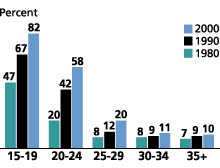
Shotgun Weddings a Sign of the Times in Japan
Date
July 26, 2002
Author
(July 2002) When it comes to creating a family, many young Japanese are dispensing with tradition. No longer compelled to live by their parents’ mores, many are staying single longer and conceiving children before getting married. A recent report by the Japanese Ministry of Health, Labor, and Welfare sheds light on these trends with an analysis of contemporary marriage patterns and with birth statistics for 2000.
According to the report, the median age at first marriage for women increased from 25 in 1975 to 27 in 2000, and its increase is accelerating. It took 15 years (from 1977 to 1992) for the median age to rise from 25 to 26, but it took just eight years to rise again, to 27 in 2000. Not surprisingly, with their marriages occurring later, Japanese women are having their first babies later. The average age for becoming a mother was 26 in 1975, and 28 in 2000.
Many Japanese women, though, are conceiving before marrying. Of the 569,000 first births recorded by the ministry for 2000, 26 percent were to women who had become pregnant before marrying. This figure marks a doubling from 13 percent in 1980. But the rise has been even more rapid among younger women. In 2000, 58 percent of first-born babies delivered to women ages 20 to 24 were conceived before marriage, compared with 20 percent in 1980. Among first births to teen mothers, 82 percent were conceived out of wedlock (see figure and table).
First-Born Born Babies Conceived out of Wedlock, by Mother’s Age, Japan

Source: Japanese Ministry of Health, Labor, and Welfare.
First-Born Born Babies Conceived out of Wedlock, Japan
| Year | First-Born Babies Conceived Before Marriage | All First-Born Babies | % of First-Born Babies Conceived Before Marriage |
|---|---|---|---|
| 1980 | 83,000 | 660,000 | 13 |
| 1990 | 109,000 | 522,000 | 21 |
| 2000 | 150,000 | 569,000 | 26 |
Source: Japanese Ministry of Health, Labor, and Welfare.
The pregnancy-before-marriage phenomenon gained prominence when a teen pop singer, Namie Amuro, announced her marriage and three-month pregnancy in 1997. Many young actresses have followed, and as a result the mass media created the term dekichatta kekkon (loosely translated as “gotta marry”) to describe marriage due to pregnancy.
According to an article that appeared last year in the Asahi Shimbun’s weekly AERA, shotgun marriages in Japan fit into one of two categories. The first is among teens who do not use contraceptives and get pregnant. The other is people in their twenties or thirties who intentionally do not use contraceptives so as to have a reason to get married. Machiko Yanagishita, a demographer at Josai International University in Japan, believes that young Japanese often cannot find a good reason, or the right timing, to get married, probably because they have less parental or social pressure to do so. “Pregnancy would be a ‘legitimate’ reason for them to consider marriage seriously,” she said.
Haruna Kashiwase is the population information assistant at PRB.
For More Information
The summary report “Birth: Special Survey of Vital Statistics,” only available in Japanese, can be accessed at the ministry’s website: www.mhlw.go.jp/toukei/saikin/hw/jinkou/tokusyu/syussyo-4/index.html.
